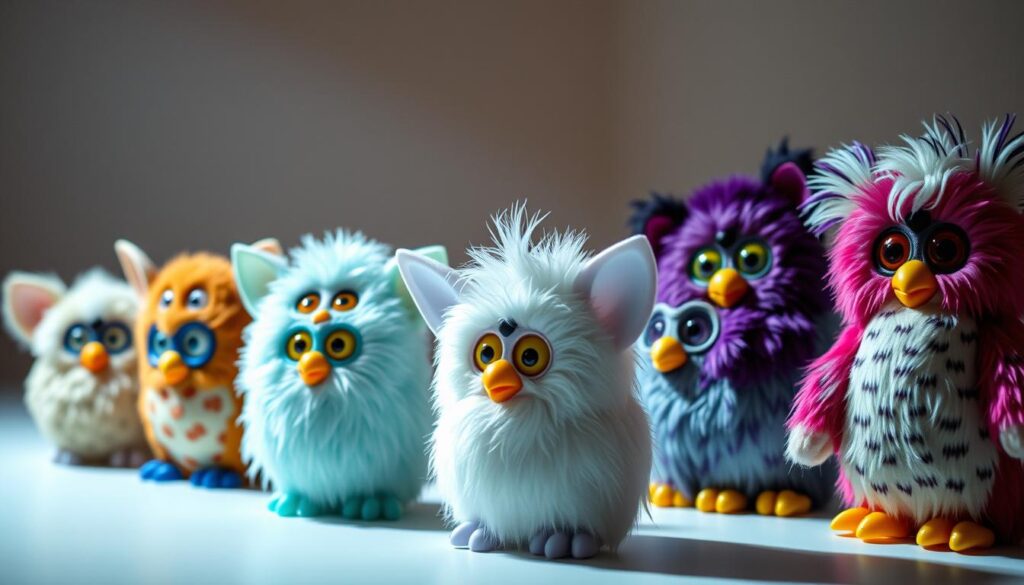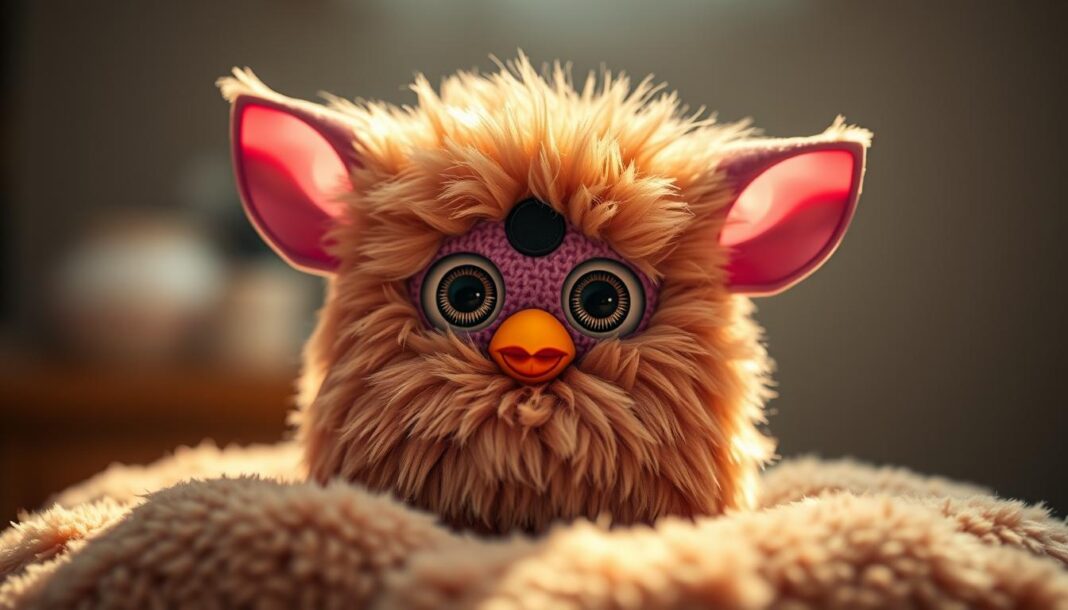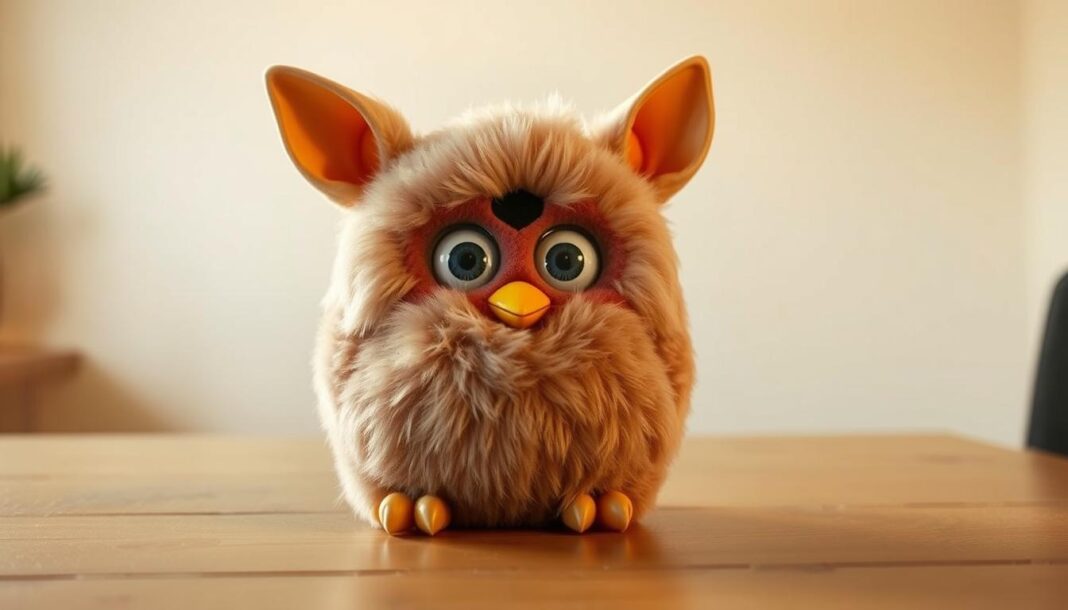Remember the first successful domestic robot that stole hearts in the late ’90s? This iconic toy became an instant hit, selling over 40 million units in just three years. Its blend of interactive features and quirky personality made it a must-have for kids and collectors alike.
Now, the new Furby is back with a modern twist. Priced at $70, the 2023 version boasts 600+ responses, five voice modes, and vibrant colors like purple and coral. Unlike smart devices, it keeps things simple—no internet needed, just pure fun.
From The Simpsons to blockbuster films, this toy has left its mark on pop culture. Despite urban legends about a national security ban, it remains a beloved companion. With meditation modes and light shows, it’s the ultimate BFF for all ages.
The Fascinating History of Furby
Behind every legendary toy lies an extraordinary origin story. This interactive companion was originally released in 1998 after an 18-month journey from sketch to shelf. Its blend of tech and charm reshaped the toy industry overnight.
From Concept to Cultural Phenomenon
Navy veteran Dave Hampton and toy designer Caleb Chung spent nine months perfecting the prototype. They created a unique *Furbish language* to make the toy feel alive. By 1998, their invention debuted at the American International Toy Fair, sparking instant demand.
Sales skyrocketed—1.8 million units sold in 1998, jumping to 14 million in 1999. Retail priced at $35, shortages drove resale markets above $300. Collectors hunted rare variants, while scams erupted over fake listings.
Key Inventors and Early Success
Richard Levy, a licensing expert, secured Tiger Electronics as the manufacturer. This partnership ensured global distribution. By 2000, McDonald’s UK launched eight Furby-Shelby Happy Meal toys, cementing its pop-culture status.
In the United States, the toy became a holiday must-have. Its success proved that simplicity—no internet, just sensors and personality—could captivate millions. Today, its legacy lives on in modern iterations.
How to Care for Your Furby
Keeping your electronic pet in top shape ensures years of interactive fun. Whether you own a vintage model or the 2023 version, simple upkeep preserves its charm and functionality.
Basic Maintenance and Cleaning
Different generations require unique care. Original plush *fur* can be gently brushed, while neon synthetics need a damp cloth. Avoid harsh cleaners—they damage the *sensors* and voice chips.
For the 2023 model, use the included comb for its fluffy exterior. Store it upright to prevent motor wear in the neck joint, a common issue called “Furby neck.”
Battery Tips and Longevity
All models run on 4xAAA batteries. Replace them every 3-4 months with heavy use. The *switch* to rechargeable options saves money and reduces waste.
Vintage units may need a manual reset if *sensors* freeze. Newer versions auto-shut off after inactivity. For Bluetooth-enabled Connect models, update firmware to fix security gaps.
Store in a dry place to protect voice synthesis from humidity. With these *battery tips*, your toy stays lively for years.
Evolution of Furby: Generations and Features
Technology reshaped this beloved companion over time, evolving its features and capabilities. Each generation introduced hardware upgrades, language expansions, and design tweaks—some celebrated, others controversial.

First Generation (1998-2002)
The original models ran on a 6502 microprocessor, the same chip powering early Apple computers. Their LCD eyes displayed emotions, while infrared ports allowed limited communication between units.
Voice synthesis was simplistic but charming, with nine languages. Collectors still seek rare variants like the 1999 Funky Furby, known for its tie-dye fur.
Emoto-Tronic and Modern Iterations (2005-Present)
Post-2005 models adopted the Sunplus SPC81A microcontroller, enabling voice recognition and smoother movements. The 2012 reboot supported 14 languages, including Mandarin and Polish.
Later designs polarized fans. The 2014 Furby Boom Crystal featured neon fur, while 2015’s Furbacca merged the toy with Star Wars branding. The 2023 version removed LCD eyes and app integration, opting for hand-drawn designs.
| Feature | 1998-2002 | 2005-Present |
|---|---|---|
| Processor | 6502 | Sunplus SPC81A |
| Languages | 9 | 6-14 |
| Colors | Pastels | Neon, metallics |
| Connectivity | Infrared | Bluetooth/app |
Furby’s Technology and How It Works
Beneath the fluffy exterior, advanced hardware brought it to life. The original models used a 6502 microprocessor, the same chip found in early Apple computers. This tiny brain powered everything from speech to movement, making it a mini-robot ahead of its time.
The 6502 Microprocessor and Voice Synthesis
Its voice synthesis relied on a TSP50C04 chip, sampling sounds at just 400Hz. Though primitive by today’s standards, this created its iconic squeaks and giggles. The source code fit into 80 KiB of ROM—smaller than a modern text file.
Circuit-bending enthusiasts later hacked these systems. The Quinlan/Rees mods altered pitch and timing, turning the toy into a glitchy synth. MIT even studied how kids interacted with its responses in a 2004 experiment.
Infrared Communication and Sensors
Early versions “talked” to each other via infrared (980nm wavelength). With a 10cm range, they could sync dances or games. Sensors detected light, touch, and motion, triggering 600+ reactions.
Newer models swapped infrared for Bluetooth. The 2016 Connect’s LCD eyes displayed animations and paired with an app. However, its open protocol raised security concerns—unlike the offline simplicity of classics.
Furby’s Unexpected Impact on National Security
In 1999, an unlikely toy sparked security concerns at the highest levels of government. A declassified NSA memo revealed fears that its infrared sensors and basic processors could be exploited for espionage. Though never proven, the myth persists—even influencing post-9/11 policies.
The NSA Ban and Espionage Myths
Norfolk Naval Shipyard outright banned furbies in 1999, citing potential audio recording risks. The FOIA-released memo showed internal debates, though Furby.ASM code proved it lacked memory for such functions. Tiger Electronics later clarified: its furby source code couldn’t store or transmit data.
Comparisons to Tamagotchi surveillance fears emerged. Unlike modern smart toys, early models had no internet—just 80 KiB of ROM. Yet DEF CON 2017 exposed Bluetooth vulnerabilities in newer versions, validating some concerns.
Debunking the Recording Rumors
Experts confirmed the toy’s *no-recording* design. Its 6502 chip processed only preloaded sounds, with no microphone. Hasbro’s 2023 marketing now emphasizes this, distancing from smart devices.
| Restricted Toy | Facility | Reason |
|---|---|---|
| 1998 Model | NSA Offices | Infrared “communication” fears |
| 2016 Connect | Pentagon (temporary) | Bluetooth vulnerabilities |
| 2023 Version | None | No connectivity features |
Today, it’s remembered as one of history’s top toys—not a spy tool. Its eyes may blink mischievously, but the data shows no real threat.
Why Furby Remains a Beloved Toy Today
Nostalgia meets modern charm in this iconic toy. Over 72% of 2023 buyers are millennials reliving childhood memories. The #FurbyRevival trend on TikTok proves its lasting appeal, with 800M+ views celebrating its quirky personality.
Gen Z’s love for Y2K aesthetics fuels its comeback. The new generation models keep the classic language and songs, blending retro vibes with fresh colors. Hasbro’s shift to multigenerational marketing ensures it stays relevant for years.
Unlike smart toys, its simplicity stands out. No apps or Wi-Fi—just pure interaction. Rumors of AI upgrades in 2025 hint at an exciting future. For now, these furby toys remain a joyful escape for all ages.


